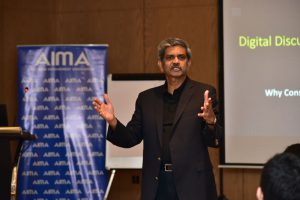Institutions need to have an acute awareness of the Industry requirements and prepare their students accordingly, said Mr. Shiv Shivakumar, Past President, AIMA at one of AIMA’s Vice Chancellors Council Session.
AIMA had organised its Vice Chancellors Council and Mr. Shiv Shivakumar, Past President, AIMA deliberated on the theme- ‘The World in Disarray: Higher Education 2030’ that focused on the required skill set for the upcoming technology revolution.
He started the Session by quoting the late Nelson Mandela, Former President, South Africa and Activist- “Education is the only weapon that can change the mind.” Further, he added that any institution that offers a degree classifies itself as Higher Education.
There are about 31,097 universities globally and the countries that have more than 1,000 universities include; USA, China, Japan, Brazil, Mexico, Russia, India and Indonesia. However, India leads the pack having 5,285 institutions. India is also home to 17% of Virtual Universities and should think of ways to lead Higher Education.
There are 20, 000 recognised Higher Education Institutions across 196 countries. However, the question is how many of them have been certified as “good” Higher Education institutions.
So, is Higher Education moving with the times? The answer is ‘No’. The whole infrastructure of education including the faculty or curriculum is moving with the times. In fact, most institutions are operating 20 years behind the current education status.
The first thing that the institution needs to recognise is the problems starting with Student Loan, which is a huge problem. Student Loan has hit $1.5 Trillion globally. So, clearly what students want are good Job Outcomes for the loan they have taken for a specific course and the pains they have taken for that.
And now there has been a fundamental shift in the process. We need to do away with old outdated degrees to relevant skills that will get the jobs. New age education is all about soft skills to manage people and process and influence people.
Every institution says that they want to be world-class. What is the exact definition of world-class though? A world-class institution is one when a student chooses it as a number one choice for a course of his/her choice, just announcing itself as one doesn’t make it one.
The world class tag will come from world class teachers, research, students and class outcomes. Teachers, on the other hand, need to reorient themselves to the New World Order as most are teaching a 19th century syllabus in the 22nd century. It is important for teachers to pivot to a new syllabus and pedagogy in order to meet the demands of the new world.
Teachers need to engage in industry and society trend research if they want to be relevant. Research is not about gathering data, it is about being insightful for a future world. The number of institutions with an insightful approach is a handful.
The institutions also need to rethink the fundamental tenets of how you need to run your business. Besides, there will be no progress if industry and academia don’t come together. Industry wants finished products or trained graduates and academia thinks that you need to furnish the education of the graduations and the industry will train. This issue has to be collectively worked out.
So, what are the future skills needed by 2025 and who is going to teach them? According to the World Economic Forum the skills required for the graduates are- problem-solving, self-management, working with people, Technology and design. And the top 10 emerging jobs that trained graduates can vouch for include-
- Data Analyst and scientist
- ML and AI Specialist
- General and Operations Manager
- Software and Applications Developer/ Analyst
- Sales and Marketing Professional
- Big Data Specialist
- Digital Transformation Specialist
- New Technology Specialist
- Org Design Specialist
- IT Services Specialist
The faculties need to have an acute awareness of the Industry requirements and prepare their students accordingly.
Lastly, he concluded the Session with some very valuable words saying that “education is a lifelong adventure” and the institutions have to reorient their vision in sync with that thought.




